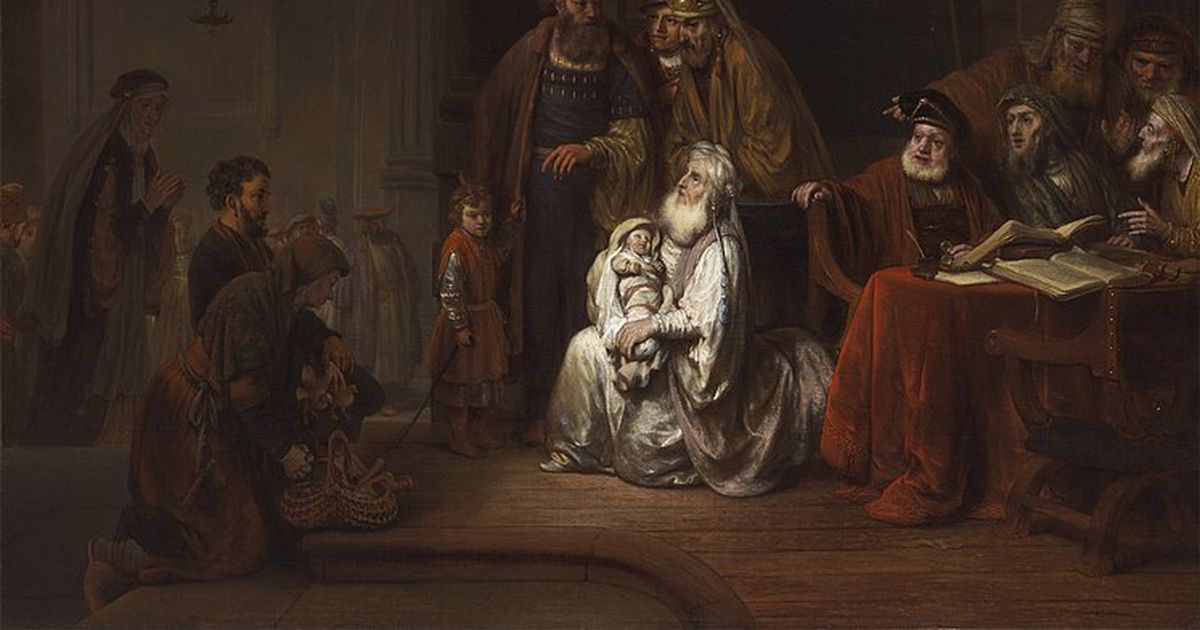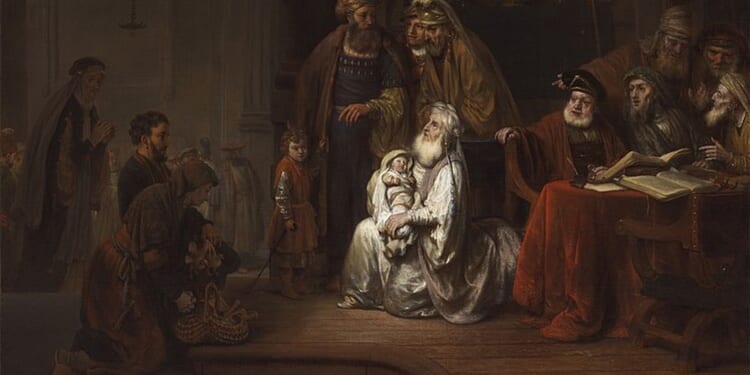
This morning’s Gospel reading is Luke 2:22–40:
When the days were completed for their purification according to the law of Moses, they took him up to Jerusalem to present him to the Lord, just as it is written in the law of the Lord, Every male that opens the womb shall be consecrated to the Lord, and to offer the sacrifice of a pair of turtledoves or two young pigeons, in accordance with the dictate in the law of the Lord.
Now there was a man in Jerusalem whose name was Simeon. This man was righteous and devout, awaiting the consolation of Israel, and the Holy Spirit was upon him. It had been revealed to him by the Holy Spirit that he should not see death before he had seen the Christ of the Lord. He came in the Spirit into the temple; and when the parents brought in the child Jesus to perform the custom of the law in regard to him, he took him into his arms and blessed God, saying: “Now, Master, you may let your servant go in peace, according to your word, for my eyes have seen your salvation, which you prepared in sight of all the peoples, a light for revelation to the Gentiles, and glory for your people Israel.” The child’s father and mother were amazed at what was said about him; and Simeon blessed them and said to Mary his mother, “Behold, this child is destined for the fall and rise of many in Israel, and to be a sign that will be contradicted —and you yourself a sword will pierce— so that the thoughts of many hearts may be revealed.” There was also a prophetess, Anna, the daughter of Phanuel, of the tribe of Asher. She was advanced in years, having lived seven years with her husband after her marriage, and then as a widow until she was eighty-four. She never left the temple, but worshiped night and day with fasting and prayer. And coming forward at that very time, she gave thanks to God and spoke about the child to all who were awaiting the redemption of Jerusalem.
When they had fulfilled all the prescriptions of the law of the Lord, they returned to Galilee, to their own town of Nazareth. The child grew and became strong, filled with wisdom; and the favor of God was upon him.
Happy New Year’s Eve to all our readers today! We hope you have some marvelous celebrations to ring in the new year … or maybe just a plan to sleep well and let the new year ring in itself. Either way, may your celebrations be joyous and/or restful!
Today, we celebrate the Feast of the Holy Family in our Church, part of the octave of Christmas which extends until the solemnity of Mary, Mother of God tomorrow. As our celebrant reminded us at the end of Mass last night, we can still wish each other Merry Christmas as we pass through the octave. And we can also reflect on the family and its purpose in the Lord’s plan of salvation, both in today’s Gospel reading and especially in our first reading from Genesis 15.
In His covenants, the Lord’s deepest communion with His children, we find a focus on family as the vehicle by which the covenant unfolds. Genesis 15 reminds us of the promise the Lord makes to Abram, childless and old, to raise up a nation from him with offspring as countless as the stars. Abram objects, noting that he and Sarai had proceeded well past the age of reproduction, and that his only heir was his steward Eliezer. God promises Abram that this nation will arise from his own flesh and blood through His intervenion, not the children of Eliezer, and that Abram will have a family so multitudinous as to defy counting.
Abram accepts this, and the Lord enters into the covenant through the sacrifice of Abram (Gen 15:9-21). Later, in Genesis 21, the Lord blessed Sarai (now Sarah) with pregnancy, and she gave birth to Isaac. Abram (now Abraham) has the family by which the nation of Israel will arise — the nation through which His covennant of salvation and reconciliation will come to pass.
At the same time, however, a rift grows between Sarah and her servant Hagar, whom she bid serve as a handmaid to Abraham and bear a child. That child, Ishmael, became a point of rivalry within this family, with Sarah adamant about excluding from Abraham’s inheritance. In Genesis 21, the Lord encourages Abraham to give way to Sarah in protecting their nuclear family by sending Hagar and Ishmael away. The Lord promises to watch over Ishmael and give him an inheritance of a great nation as well — but He clearly wants Abraham, Sarah, and Isaac to exist as a nuclear family through which His plan for salvation will unfold.
We can also see this in an earlier episode of Genesis: the Great Flood. In Genesis 6, the Lord warns Noah of His intention to destroy all that is sinful in the world while preserving that which remained good. God commands Noah to build an ark to save this remnant, but what comprises this remnant, and what will become of it? Apart from the animals which God wants preserved, a family for a new covenant of peace (Gen 6:17-21, emphasis mine):
[“]I am going to bring floodwaters on the earth to destroy all life under the heavens, every creature that has the breath of life in it. Everything on earth will perish. But I will establish my covenant with you, and you will enter the ark—you and your sons and your wife and your sons’ wives with you. You are to bring into the ark two of all living creatures, male and female, to keep them alive with you. Two of every kind of bird, of every kind of animal and of every kind of creature that moves along the ground will come to you to be kept alive. You are to take every kind of food that is to be eaten and store it away as food for you and for them.”
Again, the Lord works through the family to craft His covenants. Noah already had a family, and the Lord preserved it for His ability to reconstitute humanity. Abraham and Sarah did not have a family, but Abraham was the righteous man whose heart was inclined toward the Lord — and so the Lord provided Abraham the family necessary for His covenant to create a nation of priests and prophets to proclaim His Word to all the nations.
And now we come to the birth of Christ through the Holy Spirit. The Lord did not just choose Mary for His new and final covenant of salvation, but Joseph as well. We see this in Joseph’s dream when he learns of Mary’s pregnancy, and the Lord’s call to bond together as a true family for the sake of Jesus and each other. This family structure served as the basis for Jesus’ formation to His mission. And what was His mission? To perfect God’s plan of salvation through Israel by inverting it — by having the priests go out to the nations, rather than the nations coming to Israel to hear the Word.
The family is not just a cultural creation, nor is it merely biological either. The family is God’s sanctified forum for salvation, and as such, it is our first and most important Church. As our priest said last night, every family is holy in Christianity, by the grace of God, even if we falter and fail it at times. It is where we are consecrated to the Lord, and where we begin to participate in His covenant. It is through the family that the Lord’s power is strongest, and why family life is a true calling at the same level of importance as holy orders.
Today, we celebrate the Holy Family with this in mind, and give thanks for our own families as well. May yours be blessed this Christmas octave and throughout the years.
The front-page image is “Simeon in the Temple” by Gerbrand van den Eeckhout, 1672. Held by the Leiden Collection, not currently on display. Via Wikimedia Commons.
“Sunday Reflection” is a regular feature, looking at the specific readings used in today’s Mass in Catholic parishes around the world. The reflection represents only my own point of view, intended to help prepare myself for the Lord’s day and perhaps spark a meaningful discussion. Previous Sunday Reflections from the main page can be found here.












